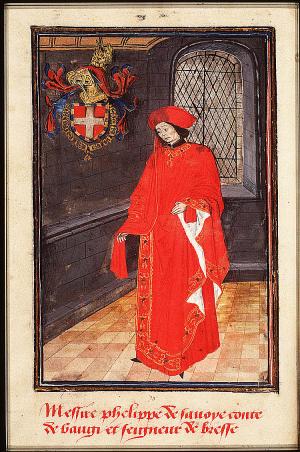Philip II, Duke of Savoy facts for kids
Quick facts for kids Philip II |
|
|---|---|

Philipp II in the manuscript Statuts, Ordonnances et Armorial de l'Ordre de la Toison d'Or, c. 1473
|
|
| Duke of Savoy | |
| Reign | 16 April 1496 – 7 November 1497 |
| Predecessor | Charles II |
| Successor | Philibert II |
| Born | 5 February 1438 Château de Chambéry, Duchy of Savoy |
| Died | 7 November 1497 (aged 59) Château de Chambéry, Duchy of Savoy |
| Spouse | Marguerite de Bourbon Claudine de Brosse |
| Issue | Louise, Countess of Angoulême Philibert II, Duke of Savoy Charles III, Duke of Savoy Philippe, Duke of Nemours Philiberta, Duchess of Nemours René of Savoy (illegitimate) Antonia of Savoy (illegitimate) |
| House | House of Savoy |
| Father | Louis of Savoy |
| Mother | Anne of Cyprus |
Philip II (born February 5, 1438 – died November 7, 1497) was a ruler known as the Duke of Savoy. He was also called the Landless because he lost some of his lands. Philip was duke for only a short time, from 1496 to 1497.
Contents
Philip II: A Short Reign
Philip was the great-uncle of the duke who ruled before him, Charles II. He was also the youngest son of Duke Louis of Savoy and Anne of Cyprus. Even though he was a male relative, Philip was not the first in line to become duke. There were several women in the family who had a stronger claim to the title.
To try and keep the ducal title within the male line of the House of Savoy, Philip arranged a marriage. His oldest son, Philibert, was married to his cousin. This cousin was the only sister of the young Duke Charles II, who had passed away. However, this plan did not work out. The girl died when she was only twelve years old. Philip himself had also died by then.
The children of Philip's older brother, Duke Amedeo IX of Savoy, were next in line. They had a right to inherit titles like Cyprus and Jerusalem. Even though women could inherit these titles, Philip took them for himself. His male successors in Savoy also continued to use these royal titles. This made their ducal title seem even more important.
Philip spent most of his life as a less important member of the ducal family. He was originally given a region called Bresse to rule. This area was near the French and Burgundian borders. But he lost control of Bresse. This is why he earned the nickname "the Landless" or "Lackland."
Philip's Family Life
Philip II had two marriages and several children. He also had children outside of his marriages.
First Marriage
Philip first married Margaret of Bourbon. She was born on February 5, 1438, and passed away in 1483. Together, they had three children:
- Louise (1476–1531): She married Charles d'Orléans, Count of Angoulême. They had important children, including:
- Francis I of France: He became King of France. His daughter, Margaret, later married Emanuele Filiberto of Savoy.
- Marguerite of Navarre (1492–1549): She became the Queen of Navarre.
- Girolamo (born 1478)
- Philibert II (1480–1504): He later became Duke of Savoy after his father.
Second Marriage
Philip's second wife was Claudine de Brosse of Brittany. She was born in 1450 and died in 1513. Claudine was the daughter of Jean II de Brosse and Nicole de Châtillon. They had six children together:
- Charles III (1486–1553): He became Duke of Savoy after his half-brother, Philibert II.
- Louis (1488–1502)
- Philip (1490–1533): He became the Duke of Nemours.
- Assolone (born 1494)
- Giovanni Amedeo (born 1495)
- Philiberta (1498–1524): She married Julian II di Medici (1479–1516), who was also a Duke of Nemours.
Other Children
Philip also had eight children with two other women.
With Libera Portoneri, he had:
- René of Savoy (1468–1525): He was known as the Grand Bastard of Savoy. René served as the governor of Nice and Provence.
- Antonia of Savoy: She married Jean II, Lord of Monaco.
- Peter of Savoy: He became a Bishop of Geneva.
With Bona di Romagnano, he had:
- Claudina (Claudia) of Savoy (died May 2, 1528): She married Jacob III, Count of Horne.
- Margherita (Margaret) of Savoy
- Giovanna (Johanna) of Savoy
- Michele (Michael) of Savoy: He became a priest.
Images for kids
 | Claudette Colvin |
 | Myrlie Evers-Williams |
 | Alberta Odell Jones |


